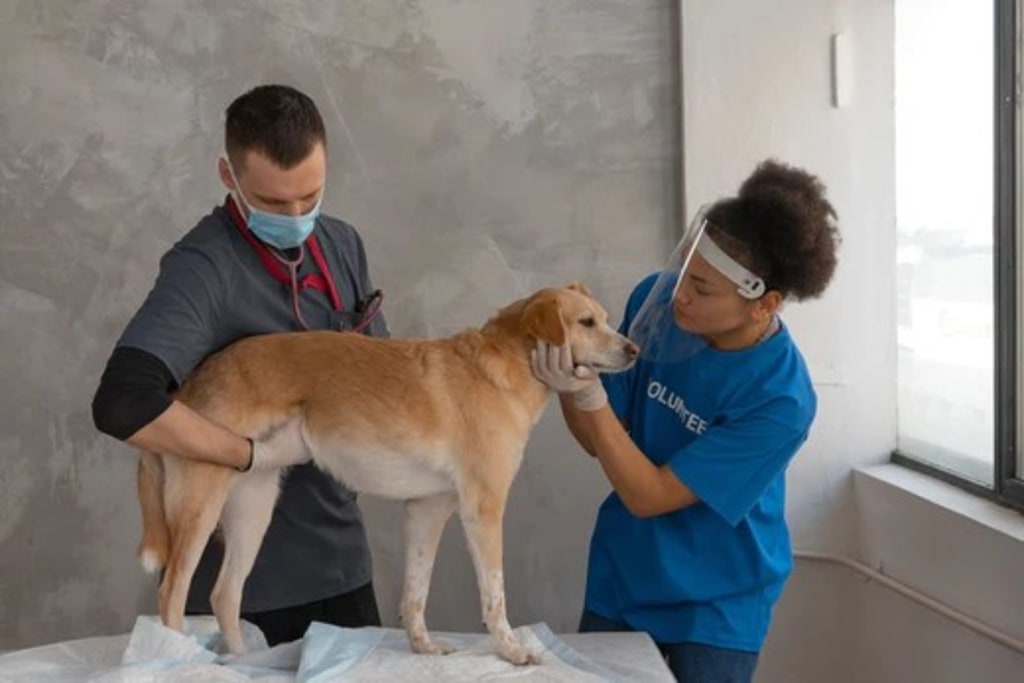How to Handle Your Dog's Vomiting
Dog Vomiting

Various factors, such as dietary choices, viral or bacterial infections, organ dysfunction, or foreign objects, frequently cause canine vomiting. Determining the cause of your dog's vomiting is important so you can provide the correct treatment and minimize further complications. This article will discuss handling your dog's vomiting to ensure their health and well-being. We will explore the potential sources of vomiting, assess the root of the problem, and provide care for your beloved pet. As pet owners, we should remain attentive to any indications suggesting our beloved canine requires medical attention from a veterinarian. Following the steps outlined in this article, you can better handle your dog's vomiting and give them the care they need for a speedy recovery.
Recognizing Vomiting in Dogs
It is important to know that it indicates an underlying medical condition when a dog keeps vomiting and should be taken seriously. Dogs often vomit due to an intolerance of something they have eaten. However, other causes can be parasitic infection, poisoning, organ malfunction, or even cancer. Symptoms of vomiting in dogs can range from occasional episodes to frequent vomiting. Signs of vomiting can include:
Retching and dry heaving.
drooling.
Abdominal contraction.
The presence of food or liquid in the vomit.
If your dog companion is experiencing frequent vomiting or appears to be in discomfort when they vomit, it is important to seek veterinary attention promptly. Your vet can diagnose the cause of the vomiting and recommend treatment for your pet.
Causes of Vomiting in Dogs
There are numerous causes of vomiting in dogs, ranging from dietary indiscretion to more serious medical conditions. Some common causes include:
Dietary Indiscretion: Eating too much or something that does not agree with your dog's digestive system can cause vomiting. This can also occur if your dog consumes something toxic or spoiled.
Gastrointestinal Disease: Canines suffering from gastrointestinal conditions, like gastritis and pancreatitis, can experience chronic vomiting. Infection, inflammation, tumors, or foreign bodies in the gastrointestinal tract can cause these disorders.
Intestinal Parasites: Intestinal parasites such as roundworms and hookworms can also cause chronic vomiting in dogs. These parasites live in the gastrointestinal tract and feed off the nutrients your dog consumes.
Liver Disease: Liver disease is another common cause of chronic vomiting in dogs. We should view inflammation or infection of the liver as an opportunity to focus more on our health and well-being rather than a limitation. Being conscious of the health of our pets is critical, as such conditions can alter the pet's body's capacity to process and absorb essential nutrients from food.
Kidney Disease: Canine kidney disease can also bring about chronic vomiting as a result of an accumulation of toxins in the body that can't be eliminated through urination efficiently.
Cancer: Cancer is another possible cause of chronic vomiting in dogs. Tumors located anywhere along the gastrointestinal tract can interfere with digestion and absorption, leading to frequent vomiting episodes.
Identifying the Cause
Dog vomiting can stem from various sources, ranging from minor issues such as overindulgence to more concerning illnesses. It is important to identify the cause of the vomiting to provide the appropriate treatment. The first step is to observe your dog, noting any changes in behavior or appetite before the onset of vomiting. Additionally, check for any signs of physical trauma or ingestion of foreign objects causing the vomiting. Additionally, consider environmental factors like changes in diet, new cleaning products, or other changes that may be causing an allergic reaction. Suppose the vomit contains blood or mucus or persists for more than 24 hours. It is important to seek veterinary care immediately, as this may indicate a more serious illness such as gastritis or an obstruction. Identifying the cause of vomiting can help ensure your dog receives the appropriate treatment and a speedy recovery.
Treatment Options
The treatment for vomiting in dogs depends on the underlying cause. Your veterinarian may suggest that you withhold food from your pet for 12 to 24 hours and provide plenty of fluids to prevent dehydration should overeating or excessive drinking cause their illness. Your veterinarian may also recommend administering activated charcoal to help absorb toxins in your dog's system. Your veterinarian may prescribe antibiotics or deworming medications if the cause is a gastrointestinal disease or parasites. For hepatic or nephritic sickness, your veterinary surgeon may suggest dietary modifications and remedies to facilitate and supervise symptoms. If cancer is conjectured, more testing may be required to confirm the diagnosis and choose the top-notch line of action, which could incorporate surgery, chemo, or radiotherapy.
Preventing Vomiting
Vomiting is an unpleasant experience for both dogs and their owners. Fortunately, several steps can be taken to prevent vomiting in dogs:
Make sure your pup is getting adequate nutrition. Feed the dogs high-quality food and provide plenty of fresh, clean water.
Ensure your pup gets enough exercise; regular exercise helps keep their digestive system healthy. Consult your veterinarian for the most suitable dietary plans or medications to help manage your dog's sensitive stomach or allergies for optimal results. With their expertise, you can ensure your dog remains healthy and comfortable.
Ensure your dog doesn't eat anything off the ground or other questionable items that could upset its stomach.
Be mindful of any indicators of distress or unease that may cause your canine to vomit; if they appear anxious, reach out to a veterinarian promptly to assist them in handling the matter.
Following these steps can help keep your pup's digestive system healthy and prevent vomiting.
Conclusion
In conclusion, paying attention to your dog's vomiting is important. Though occasional vomiting may not cause concern, frequent or consistent vomiting can indicate a more serious health issue. By monitoring your dog closely, you can handle their vomiting in the best way possible. However, if it continues, getting professional advice from your vet is advisable. Giving your pet dog healthy balanced nutrition, sufficient hydration, and regular physical exercise is important to your pet's well-being. You can ensure your pet is healthy and content by implementing precautionary steps like these. By following these recommendations, you can guarantee the vitality and prosperity of your beloved pet, ensuring its robustness and well-being.
About the Creator
Portrait My Pet
Portrait My Pet Blog, we consider our furry companions as family members. Whether you're a pet owner or embarking on the exciting journey of pet parenthood for the first time, our blog is your trusted source for all things pet related.






Comments
There are no comments for this story
Be the first to respond and start the conversation.